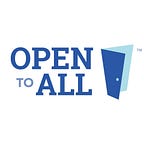Advocacy, Education, and Empowerment: Creating Cross-Community Solidarity Amidst Rising Anti-Asian Hate
The Asian American community involves more than 50 different ethnicities and over 100 languages. According to the 2020 Census, this group accounts for a little over 7% of our population, meaning about 24 million Asian Americans reside in the United States. There’s a rich diversity within the Asian American community, with each group having its own culture, characteristics, and history that deserve to be recognized and celebrated.
In April, John C. Yang, President and Executive Director of Asian Americans Advancing Justice — AAJC, presented a virtual briefing for Open to All’s corporate partners in recognition of Asian American Pacific Islander (AAPI) Heritage Month. During this conversation, John identified three essential components for enhancing the lives and rights of Asian Americans: advocacy, education, and empowerment. These three focal areas are directly tied to creating a collective movement of cross-community solidarity.
Advocate
Started in 1991, Asian Americans Advancing Justice — AAJC (Advancing Justice — AAJC ) has long worked to advance Asian Americans’ civil and human rights while fostering a fair and equitable society for everyone. As a Washington, DC-based organization, Asian Americans Advancing Justice has played a crucial role in supporting policies that affect the Asian American population and other marginalized communities, including legislation centered on immigration, voting rights, and anti-Asian hate.
In 2021, Advancing Justice– AAJC’s advocacy efforts influenced the passage of the COVID-19 Hate Crimes Act. Anti-Asian rhetoric ran rampant throughout the COVID-19 pandemic, such as the sickness being incorrectly referred to as the “Chinese virus” or “Wuhan flu.” Knowing the importance of safeguarding their community, Asian Americans Advancing Justice publicly supported the Act, which generated improved hate crime reporting and data collection to better hold governmental agencies responsible for the needs of our communities. During the same period, Open to All and Advancing Justice — AAJC collaborated to release a Stop Anti-Asian Hate toolkit.
The organization also works dutifully to advance the lives of others via litigation. Asian Americans Advancing Justice joined other prominent organizations in suing the Trump administration over an unconstitutional citizenship question on the 2020 Census and won. Knowing that over 90% of the Asian American population is comprised of immigrants or children of immigrants, Asian Americans Advancing Justice was aware that a question regarding citizenship would severely depress response rates, which would lead to inaccurate data on all affected communities. From supporting laws to filing litigation, Asian Americans Advancing Justice — AAJC is a key player in promoting and mitigating issues that substantially impact the lives of Asian American, Pacific Islander, and immigrant communities.
Educate
The history of marginalized communities has traditionally been diminished in our classroom lesson plans. Now, even historical figures and events are being completely erased from our schools’ textbooks and classrooms. To learn from our nation’s past, we must guarantee it’s being taught truthfully. This includes debunking myths and preserving historical truths.
Take, for example, the perception of Asian Americans as “perpetual foreigners.” One in three Americans believed that Asian Americans had conflicting loyalties between the United States and their so-called “home country.” No matter how long they’ve been in this country, Asian Americans are still seen as having dual loyalties. This dangerous stereotype is deeply connected to past incidents in American history.
Around the same time Chinese Americans were putting their lives in danger to build the Transcontinental Railroad, the Chinese Exclusion Act was established, prohibiting immigration to the U.S. from China. Similar anti-Asian sentiments remained prevalent in the U.S. for decades to come. During World War II, the U.S. government operated internment camps where Americans of Japanese descent were wrongfully imprisoned based on fictitious evidence alleging dual loyalties. Amid the 1980s trade war between the United States and Japan, a man named Vincent Chin was brutally beaten to death by an unemployed auto worker and his stepfather, who wrongfully believed that Vincent was Japanese. A similar incident occurred in the days following 9/11: Balbar Singh Sodi, a Sikh-American entrepreneur, was killed by a gunman who claimed the act was completed in the name of “America.”
Across the country, such histories are being erased. Politicians have banned books and prohibited open conversations about race, gender, and class. However, education, inclusion, and honesty are essential building blocks for a more just future. With the recent spike in hate crimes targeting communities of color, it’s now more important than ever to share these stories and stop them from happening again.
Empower
Expanding civil rights and safeguarding factual histories is not work for just one individual or organization to complete on their own. True power lies in uniting communities and encouraging others to speak up. Advancing Justice — AAJC does so by empowering grassroot organizations through subgrants and training. The nonprofit is dedicated to equipping smaller organizations with the infrastructure necessary to generate impact in their communities.
Participating in community functions, partnering with local nonprofits, and co-sponsoring engagement events are all ways that companies can demonstrate solidarity. AAPI-focused employee resource groups (ERGs) are another way for businesses to connect with the community. ERGs grant employees the opportunity to express themselves, request additional resources, and commune with their co-workers. Empowering your employees to participate in ERGs ensures that their voices are not just heard, but also respected and cared for.
Advancing Justice — AAJC provides a wide range of services for companies looking to further empower their Asian American employees and community members. Their president, John C. Yang, presently serves on several corporations’ diversity councils, and would welcome the opportunity to join more! A representative from the Advancing Justice — AAJC is also available to attend or lead discussions hosted by ERGs. The nonprofit is also willing to consult on future AAPI Heritage Month campaigns or programs. Regardless of how you involve Advancing Justice — AAJC in your work, the organization is devoted to assisting you in ensuring that your actions benefit the AAPI community in an effective and authentic way.
